Tag Archives: Uganda
Posted on July 15, 2016 by Sophie Hicks
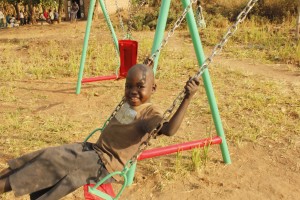
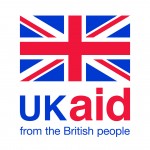
Much of a child’s early years are spent playing, exploring and testing their environment and own personal boundaries. All of this play has significant and proven benefits for a child’s early development. Research has shown that children who regularly engage in play-based learning have better cognitive flexibility, working memory and self-regulation ability.
Here at African Revival, we recognise the immense benefits of play-based learning and have incorporated it as one of the major elements of our jumpstart! nursery education programme. In our 10 jumpstart! schools, we are building playgrounds, training teachers in how to guide play-based learning and make their own play materials using natural materials, and even teaching parents how to encourage productive play at home. We know that play is incredibly important for early childhood development – but what exactly are the top benefits?
- Better behaviour
Children behave better in the classroom when they have had the chance to blow off steam and release energy on the playground during the day. Playing is a known method of stress release that can help with a child’s emotional welfare, as nursery teacher Gino, from Purongo Hill Primary School in Nwoya district says: “the playground is where the children release their stress and refresh their minds between learning”
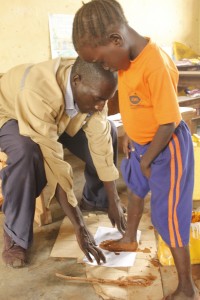
- Good social skills
Play can help young children become more aware of other people’s feelings and develop empathy. During play, whether it is inside or outside of the environment, children must interact and cooperate with each other, as well as share play equipment which requires good communication skills. Children can build relationships, learn to resolve conflicts, negotiate and regulate their emotions and behaviors. According to nursery teacher Gino, increased play-based learning at Purongo Hill has “eliminated that spirit of being selfish, and also helping the children with sharing because of that thing of collaboration”
- Improves academic performance
In 2009, research from the American Journal of School Health found that the more physical activity tests children can pass, the more likely they are to do well on academic tests. According to psychologist Kathryn Hirsch Pasek, “Children learn to count when they’re doing hopscotch […] They are telling stories on the playground, and they’re getting active.”
Furthermore, play can nurture qualities like self-discipline and attentional control, which can be just as vital for school readiness as content knowledge. Children with longer attention spans and self-control can focus more on tasks in the classroom. This is because when children engage in make-believe play that involves role playing, there are generally rules that they must follow which involves regulating their natural self and behavior. By practicing this in a safe, fun environment, their self-control is enhanced, which can then be transferred to a classroom setting.
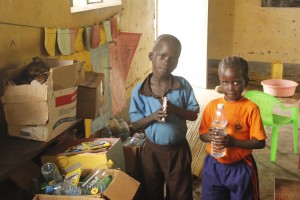
- Language development
Moreover, make-believe play that involves role playing can also help children to develop their language skills, as was shown in a British study (Lewis, 2000). Infant pupils were asked to engage in symbolic play, whereby they use objects, actions or ideas to represent other objects, actions or ideas. For example, a child may put a wooden block to her ear as a pretend mobile phone. Children who scored higher on a test of symbolic play had better language skills, both in terms of what they understood and spoke. This suggests that play helps to develop and solidify language skills.
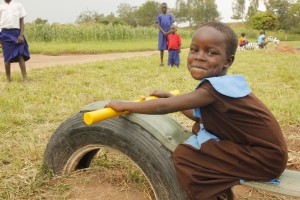
- Increases enthusiasm for learning
In northern Uganda, where drop out rates amongst primary school students are very high, play-based learning can encourage pupils to stay in school and attend more frequently. Indeed, at Purongo Hill Primary School in Nwoya district, nursery teacher Gino says that enrolment has skyrocketed since African Revival constructed a playground at the school (from 30 pupils in the nursery section to 120): “the playground has been an advantage to us because it has drawn in children, increased enrolment and reduced drop outs”.
Posted in News |
Tagged Acholi, African Revival, Development, ECD, Headteacher, inspiration, Inspiring Head Teacher, International Development, Jumpstart!, play, Teacher training, Uganda |
Leave a comment
Posted on March 14, 2016 by Elaine Miller
Head Teacher Geoffrey was posted to a rural school in Northern Uganda after the 20 year insurgency by the Lord’s Resistance Army. Over the last few years he has transformed his school.

Koch Goma Primary School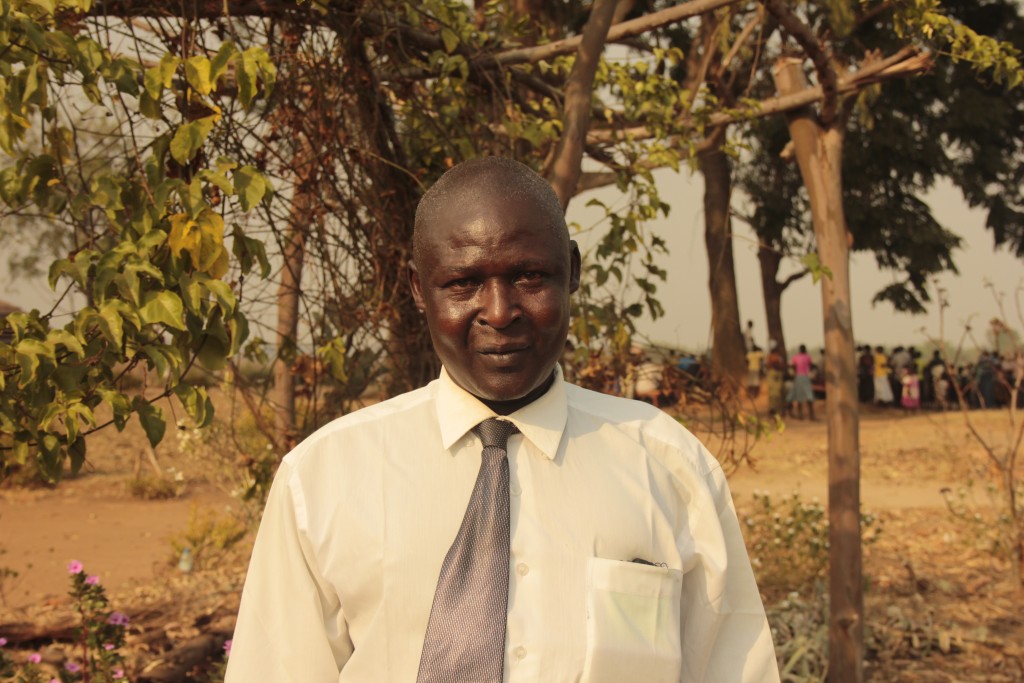
This is my fifth year at Koch Goma Primary School. Before the insurgency by the Lord’s Resistance Army, this school was one of the best in the country. But 20 years of insurgency brought it to the ground. All the books were destroyed, all the desks were destroyed, all the school assets were destroyed.
For several years during the insurgency, the school was transferred to Gulu town, about 27km away, for safety. Later, the school returned to this site. But this site had become an Internally Displaced People’s Camp. All the parents, teachers and pupils had been moved into the camp and this changed the culture of the school. Teachers had become undisciplined, they didn’t want to teach and they didn’t want to plan. The children were so undisciplined. The syllabus was never completed. You would find a child in Year 6 who couldn’t even write his name.
Special Assignment
I was posted here on a special assignment to restore the school. Before I was posted, there were 3 other Head Teachers who refused the posting. In 2011, two teachers were beaten by children. Teachers started to fear pupils. Parents had lost all faith in the school. This was a place that was not a school. When I started, some children tried to beat me. But I said to them, “I have not come to fight. I have come so one day you can be a Minister. I have come so one day you can be a Doctor. I have come so you can be an important person, a person we can respect.”
Then I said to the District Education Officer, “Give me four years”. I wanted to work on changing attitudes and this takes time. So I put in place three strategies.
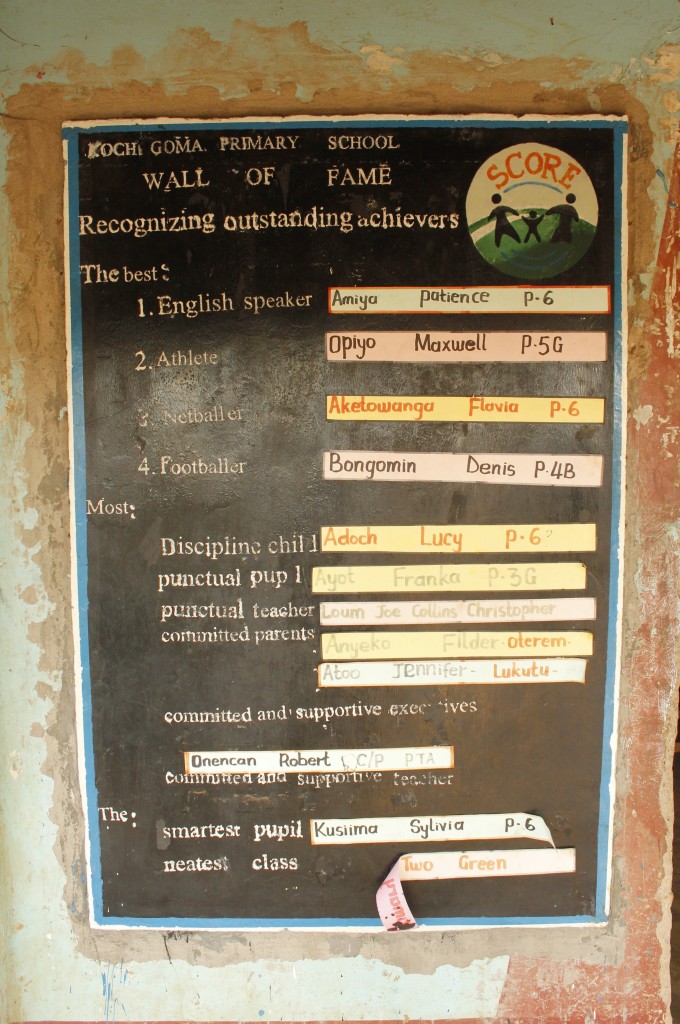 Three Strategies
Three Strategies
The first was simple, to change the physical layout of the school. I created paths, planted flowerbeds and I bought classroom doors. I painted the classrooms and I put posters up. I built a football pitch and a netball pitch, space for young children too and for free games. When the parents saw how the school was looking, they started feeling positive. They were coming to love the school.
My second strategy was to change the way money was used in the school. I researched a local financial institution called The Circle. Then I negotiated with the School Management Committee and the Parent Teacher Association to bank our money there. I said, “We don’t want to handle money in the school. When the parents come to pay fees, we want them to pick up a slip, and deposit the money in The Circle”. When the various school departments need money, they fill out a request slip. I verify the request with the PTA Chair and the School Treasurer and we withdraw the money from The Circle. We keep receipts for all transactions. When the parents saw this, they said, “Our money is safe”.
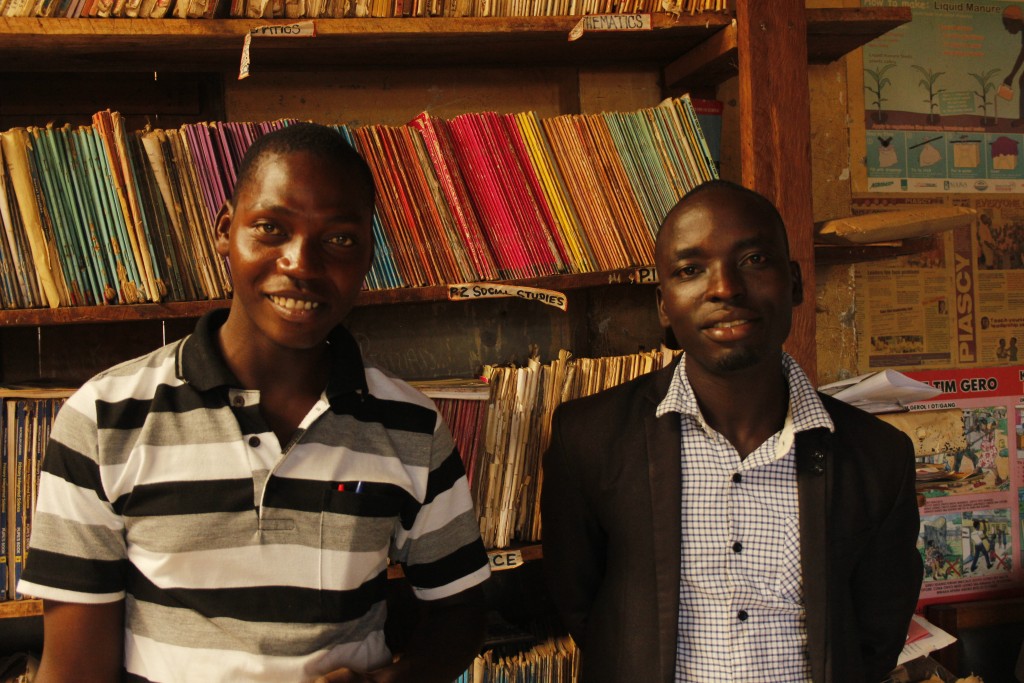 The third thing I did was to train teachers. We found the children couldn’t read or write, and then we went to the teachers and we found the teachers couldn’t read or write. So we began with the teachers. I was a tutor myself [someone who trains teachers at a Teacher Training College] for four years, so I also trained them on professional ethics and code of conduct. Then we negotiated with the parents to send their children in on Saturdays, and we asked the District Education Officer to let us stay open during holidays. We used this time to catch up on the syllabus.
The third thing I did was to train teachers. We found the children couldn’t read or write, and then we went to the teachers and we found the teachers couldn’t read or write. So we began with the teachers. I was a tutor myself [someone who trains teachers at a Teacher Training College] for four years, so I also trained them on professional ethics and code of conduct. Then we negotiated with the parents to send their children in on Saturdays, and we asked the District Education Officer to let us stay open during holidays. We used this time to catch up on the syllabus.
Our results
We are very happy because last year we heard our Primary Leaving Exam results were the best in the district. Our challenge now is classrooms. Parents have rushed to register their children here for the new school year, but we don’t have space so we turn some away. We have 1,200 children registered for 2016, plus 200 more in the nursery section. The District Education Officer said if we had more classrooms, they would send us more teachers.
All in all, I am trying to create teamwork. I am trying to encourage people to feel responsible for what is happening in the school. Then when we are successful, it is a success for the whole team. In everything I’m doing, I’m trying to involve people. I don’t do it alone and that’s why we are successful. I hope our school will continue leading!
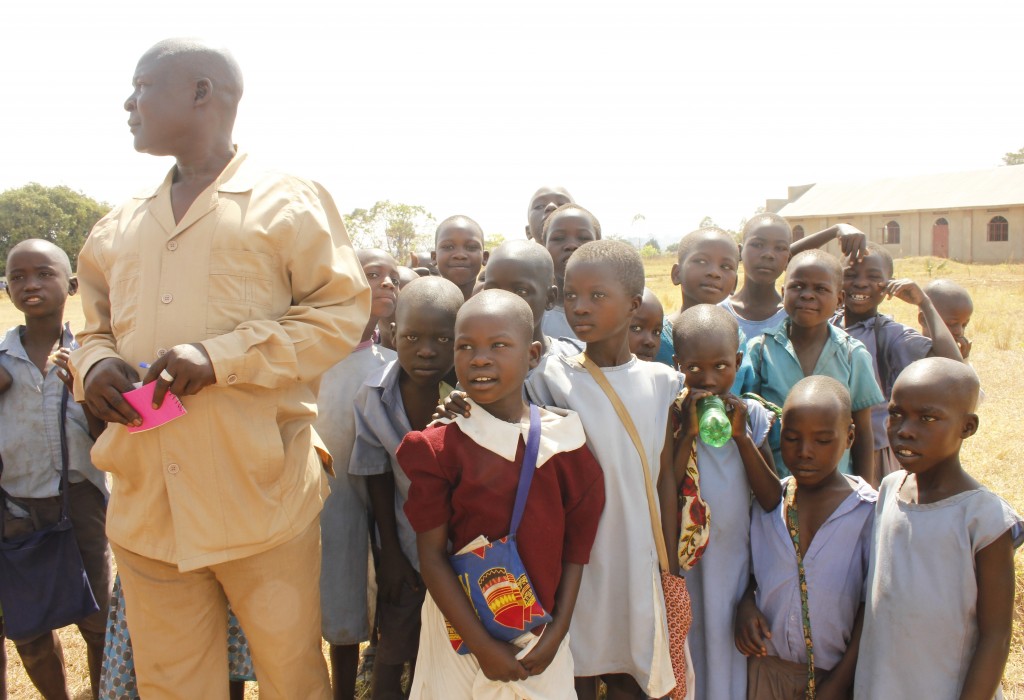
Posted in News |
Tagged Education, Head Teacher, Inspiring Head Teachers, Lord's Resistance Army, Uganda |
Leave a comment
Posted on March 8, 2016 by Elaine Miller
This International Women’s Day, we hear from inspirational Head Teacher Lily-Rose on what she is doing for Girls Education in Northern Uganda
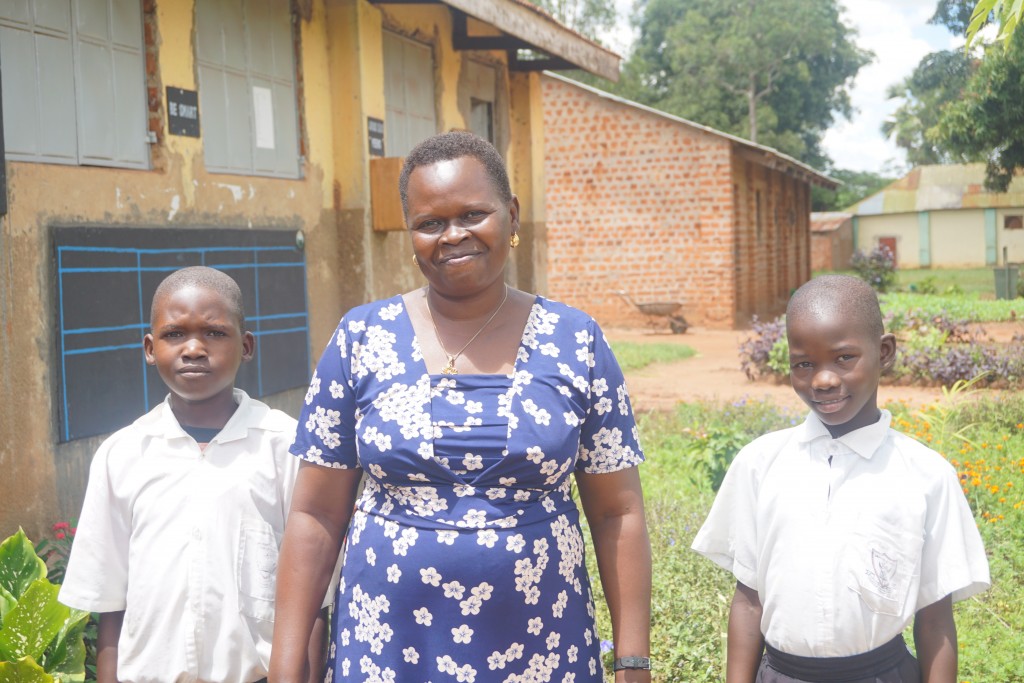
“Right from when I was in primary school, I admired teachers. They were well-respected people with good families. I had one teacher called Rosabella. She was organised and hard working, I said to myself, ‘The day I become a teacher I will be like Rosabella’.
This is my fifth year at Anaka Primary School, but I’ve been a Head Teacher for 15 years. Many people here know me and that makes me proud to be a Head Teacher. What I enjoy most about my job is having children who are disciplined, parents who love their school, and teachers who work together. This makes me very happy.
As an important lady in the community, I try to share my own experiences with our girls. I was once a young girl too with the same challenges. I have female teachers who are role models and we have monthly meetings with the girls to discuss any issues. On top of that, we have built girls’ changing and washrooms and we have trained the parents on how to make sanitary pads.
At least once a term I invite female parents to the school. Not all of them know how to take care of their girls. Some of them don’t provide basic items like soap or sanitary pads. We help the parents understand their responsibilities. We tell them to provide for their girls so they don’t get interested in the men outside school. By providing for our girls at home, we can keep them in school.
Above all, I’m a mother and a role model to these girls. I hope that because of me, many girls will continue studying and will become something in the future. I hope many successful girls will come out of my life!
My advice would be to send your children to school. When many people are educated, the country will never remain poor. And don’t forget your girls. Some parents treat their boys as if they are special or more important than girls, but I tell them to treat their boys and girls equally. All of them are special people who can succeed in anything.”
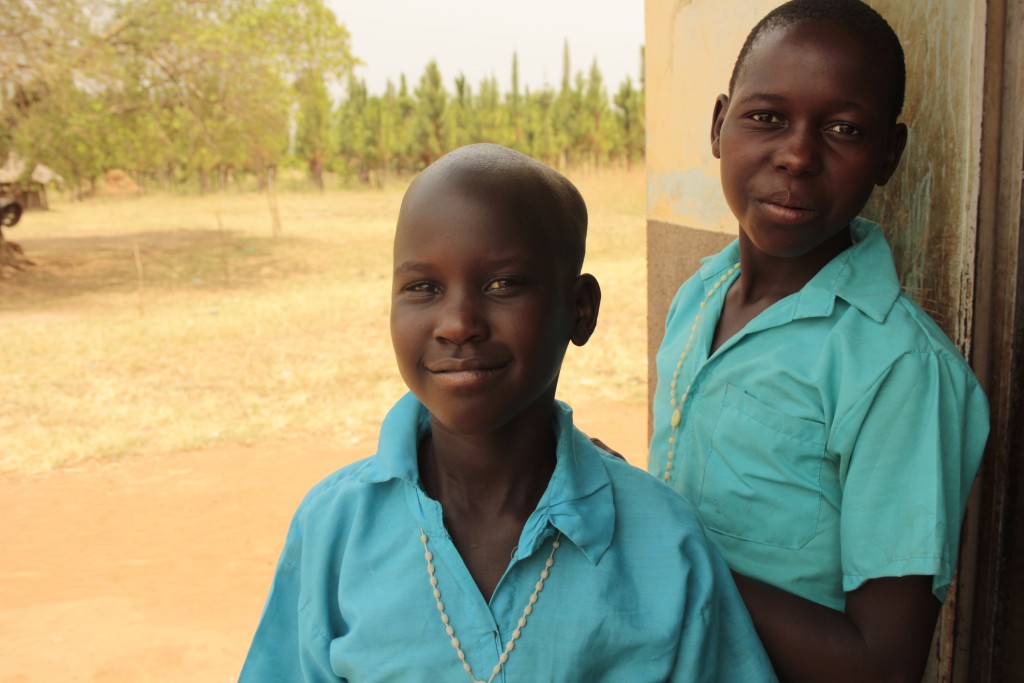
Posted in News |
Tagged Education, Girls Education, Head Teacher, Inspiring Head Teacher, International Womens Day, Northern Uganda, Uganda |
Leave a comment
Posted on February 23, 2016 by Sophie Hicks
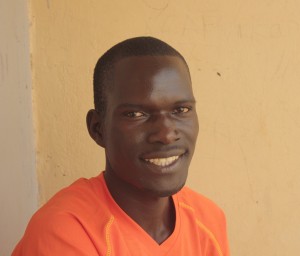

Sunday is only 22 years old, yet already he is the headteacher of Lacek Community School in Nwoya district! To hold such an important position at such a young age is testimony to both his considerable talents as a teacher and to how highly he is considered in the surrounding community. But Sunday is not just a Headteacher. He is also participating in the Teacher Changemaker network, which we coordinate in partnership with STIR Education in Northern Uganda! So far, Sunday has implemented an incredibly successful Village Savings and Loans Association in Lacek School (they have saved an impressive 3,775,400 since May) which is also helping to bring parents closer to the school to monitor their children’s education, improving student motivation and performance. Read on to discover how Sunday is changing the way the local community views education and impacting on the next generation at Lacek Community School!
My parents were escaping from the Lord’s Resistence Army, so I was born in Gulu. But our original homeland is in Kinene. We moved back to Kinene in 2006 when the war ended. I was 13 years old. I have only 3 brothers without any girls. My mother gave birth to 4 girls but they all passed away. There were only 4 boys left. I have four half brothers and sisters from my fathers second wife. We all live together in Kinene. My father had many wives, almost 11. He is 80 years old now.
Teaching became interesting to me because of a certain teacher in my primary, called Mr Laloo. That teacher really made me who I am. I struggled to learn English, so he put a lot of work into teaching me how to speak and write well. I liked the way he taught me, and I promised to myself I would become a teacher.
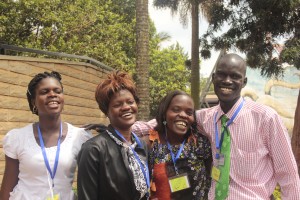 Being part of the Teacher Changemaker network made me realise that the problem in our schools is parent engagement. It touches me. There is a lack of parent engagement in these communities – parents have very negative attitudes towards education. I saw that many were not able to pay their children in school. I sat down with the School Management Committees and asked, which is the best way we can help these parents? I decided to bring the Village Savings and Loans Association (VSLA), which other localities are doing successfully. When they save money for 2 months, that money alone is able to pay the school fees for their children. So I decided to mobilize parents. Many parents joined me. Every week they come and save their money in the pool. So far they have saved 3,775,400 (since May 2015).
Being part of the Teacher Changemaker network made me realise that the problem in our schools is parent engagement. It touches me. There is a lack of parent engagement in these communities – parents have very negative attitudes towards education. I saw that many were not able to pay their children in school. I sat down with the School Management Committees and asked, which is the best way we can help these parents? I decided to bring the Village Savings and Loans Association (VSLA), which other localities are doing successfully. When they save money for 2 months, that money alone is able to pay the school fees for their children. So I decided to mobilize parents. Many parents joined me. Every week they come and save their money in the pool. So far they have saved 3,775,400 (since May 2015).
Children are getting benefits from their parents being in the VSLA. Their parents can borrow money and pay them, buy for them uniform, the scholastic materials. Also, the parents are able to monitor their children, whether they are in the class, whether they are learning. They first move around all the school compound checking what is wrong, what is good, and they feedback later.
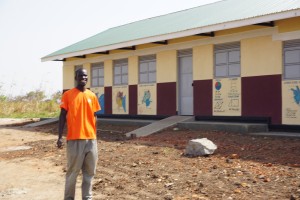 In our culture, when you are a teacher, people prefer to be like you, because teachers are able to make unknown known. So people take teachers as the most important thing for the community. The change makers. Whenever there are any problems they first consult the teacher. During village meetings, I am always the chief’s guest when they are making bylaws. I help them to decide which ways to manage the schools and build the community. And when we are making school rules, we invite the chiefs to help. So when the child is not at school, we can give a phone call to the chief to inform him about the problem within his area of service.
In our culture, when you are a teacher, people prefer to be like you, because teachers are able to make unknown known. So people take teachers as the most important thing for the community. The change makers. Whenever there are any problems they first consult the teacher. During village meetings, I am always the chief’s guest when they are making bylaws. I help them to decide which ways to manage the schools and build the community. And when we are making school rules, we invite the chiefs to help. So when the child is not at school, we can give a phone call to the chief to inform him about the problem within his area of service.
I am getting some great advice from the network, like its OK to make mistakes. For us we take mistakes as a very bad thing. When we make mistakes in the Ugandan education system, people do not like it. But when I see anyone making mistakes, I just help them, and do not tell them off. The network always tells us that through mistakes, you can learn.
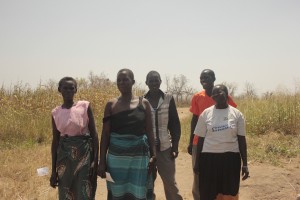 The part of the network that has motivated me a lot is friendship. Before, I didn’t know any of the other teachers in Nwoya district who are now in the network. I speak with my friend Gino (a pre-primary teacher at Purongo Hill Primary School) by phone almost daily. We just call each other and share the things from our day.
The part of the network that has motivated me a lot is friendship. Before, I didn’t know any of the other teachers in Nwoya district who are now in the network. I speak with my friend Gino (a pre-primary teacher at Purongo Hill Primary School) by phone almost daily. We just call each other and share the things from our day.
In the future, after going for my ECD diploma, I’m hoping to be a tutor and train teachers in Early Childhood Development. I can see myself so much specialised in the ECD because I understand young children’s behaviour.
My daughter, she is very stubborn! She is around 2 years old. At around 1 ½ years, she was also able to speak. She acquired language very early. I play with her everyday, even if she is not understanding everything I say. She is called Akello Charity Hope. She loves playing, she plays so much. When I reach home in the evening, we sing songs together. I will arrive and she will immediately come to me to sing songs, to speak funny things. In the future I want her to be like me – a teacher.
Posted in News |
Tagged Acholi, African Revival, Changemaker, Development, ECD, Education, endurance, Gulu, Headteacher, inspiration, International Development, Interview, Jumpstart!, Kampala, Nursery, Nursery School, Profile, Pupils, School, School Development, STIREducation, Teacher training, Uganda, World Teachers' Day |
Leave a comment
Posted on February 17, 2016 by Sophie Hicks
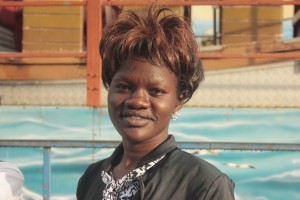

Irene started her early career as a tap dancer. Trained for a year by a man from California named Jack, she still has a real passion for the dance with ‘the glass shoes’. Now an Early Childhood Development teacher in Anaka P7 Primary School in Nwoya district, Northern Uganda, she regularly brings song and dance into her lessons as a way of energising her pupils and bringing her classroom alive. This interactive style of teaching is just one of the things she has learned from participating in Teacher Changemaker network, implemented by STIR Education and coordinated in Nwoya district by African Revival.
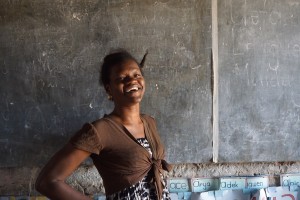 The Teacher Changemaker network encourages teachers across Uganda to introduce ‘micro innovations’, new techniques to increase the quality of education, into their lessons to respond to the challenges they face in the Ugandan education system. For Irene and her colleagues at Anaka P7, one of the main challenges is lack of parental engagement: “We decided that parental engagement is the biggest problem affecting our school. There are parents that, when you call them for a meeting, they don’t want to come. They don’t provide the scholastic materials for their children. You find a child will come to school hungry, without having eaten, and not be able to concentrate in class. Children like this end up failing.” She and her fellow teachers have introduced a procedure to counteract this challenge: “The first step is to call the parents for a meeting. The second stage is to go up to the home to see what is the problem stopping this child from performing. And the time comes when the parents start to listen, slowly, until they are now following the advice of the teacher. We have used this procedure and now there are many who come to check the progress of the children”. This micro innovation is already having positive results. This year, more children in Irene’s class passed, and she has noticed a change in the attitude of her students in class, now their parents are taking more of an interest in their education.
The Teacher Changemaker network encourages teachers across Uganda to introduce ‘micro innovations’, new techniques to increase the quality of education, into their lessons to respond to the challenges they face in the Ugandan education system. For Irene and her colleagues at Anaka P7, one of the main challenges is lack of parental engagement: “We decided that parental engagement is the biggest problem affecting our school. There are parents that, when you call them for a meeting, they don’t want to come. They don’t provide the scholastic materials for their children. You find a child will come to school hungry, without having eaten, and not be able to concentrate in class. Children like this end up failing.” She and her fellow teachers have introduced a procedure to counteract this challenge: “The first step is to call the parents for a meeting. The second stage is to go up to the home to see what is the problem stopping this child from performing. And the time comes when the parents start to listen, slowly, until they are now following the advice of the teacher. We have used this procedure and now there are many who come to check the progress of the children”. This micro innovation is already having positive results. This year, more children in Irene’s class passed, and she has noticed a change in the attitude of her students in class, now their parents are taking more of an interest in their education.
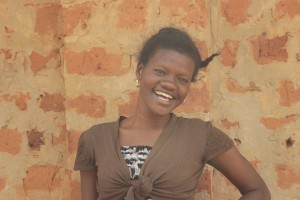 Irene is confident that the innovations and increased focus on critical analysis and problem solving that the Changemaker network has facilitated will continue to have a positive impact on her primary school: “as long as we keep innovations coming to Anaka p7, there will be a great many positive changes. Though we have some parents who don’t listen to the school, in time there will be a lot of improvements because us teachers have learned ways of solving the problems we face”
Irene is confident that the innovations and increased focus on critical analysis and problem solving that the Changemaker network has facilitated will continue to have a positive impact on her primary school: “as long as we keep innovations coming to Anaka p7, there will be a great many positive changes. Though we have some parents who don’t listen to the school, in time there will be a lot of improvements because us teachers have learned ways of solving the problems we face”
The network is also having a positive impact on Irene’s confidence and motivation as a teacher: “The network taught me that, if you are a teacher, you should have confidence in everything you do, you should be exemplary, you should have knowledge, you should be someone who searches for things that will make a change. Someone creative in the mind who will search for ways to make the children learn well and pass”.
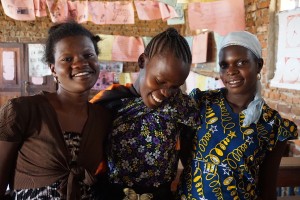 She also enjoys the unity and collaboration with the other Teacher Changemakers, which is a real advantage for all participants. Teaching in any part of the world can be a difficult job, and in Uganda the lack of good infrastructure, teaching materials and training exacerbates the already considerable challenges. By encouraging teachers to share and support each other, the Teacher Changemaker network is looking to alleviate these challenges through an informal support system that allows participants to vocalise their problems and search for solutions together. This style of network also means that innovations produced by the teachers are tailored to the specific localised environments across Uganda, rather than ready-made solutions designed out of context. This contributes to the success of the network and its popularity amongst its Changemakers, especially Irene, who advised teachers to try out the new Changemaker innovations for themselves: “My advice for other teachers is this: go and put the micro innovations into use, because they will help a lot. And help you learn how to communicate with others, discuss, be social and cooperative and many others. When you go back to school tell others to do the same!”
She also enjoys the unity and collaboration with the other Teacher Changemakers, which is a real advantage for all participants. Teaching in any part of the world can be a difficult job, and in Uganda the lack of good infrastructure, teaching materials and training exacerbates the already considerable challenges. By encouraging teachers to share and support each other, the Teacher Changemaker network is looking to alleviate these challenges through an informal support system that allows participants to vocalise their problems and search for solutions together. This style of network also means that innovations produced by the teachers are tailored to the specific localised environments across Uganda, rather than ready-made solutions designed out of context. This contributes to the success of the network and its popularity amongst its Changemakers, especially Irene, who advised teachers to try out the new Changemaker innovations for themselves: “My advice for other teachers is this: go and put the micro innovations into use, because they will help a lot. And help you learn how to communicate with others, discuss, be social and cooperative and many others. When you go back to school tell others to do the same!”
Posted in News |
Tagged Acholi, African Revival, Changemaker, Development, ECD, Education, inspiration, International Development, Jumpstart!, Kampala, Kilimanjaro, Nursery, Nursery School, Profile, Pupils, School, School Development, STIREducation, Teacher, Teacher training, Uganda |
Leave a comment
Posted on February 11, 2016 by Sophie Hicks
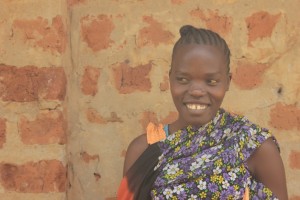 Kevin, aged 23, is a primary teacher from Anaka P7 Primary School, and a fantastic Teacher Changemaker! She is participating in STIR Education’s Teacher Changemaker network, which is designed for teachers to share ideas and innovations, as well as to provide a source of motivation for educators in what can be a difficult working environment. African Revival’s Jumpstart! team has been helping STIR to manage the network in Nwoya district, where we caught up with Kevin to find out how the Changemaker network is benefitting her and her students!
Kevin, aged 23, is a primary teacher from Anaka P7 Primary School, and a fantastic Teacher Changemaker! She is participating in STIR Education’s Teacher Changemaker network, which is designed for teachers to share ideas and innovations, as well as to provide a source of motivation for educators in what can be a difficult working environment. African Revival’s Jumpstart! team has been helping STIR to manage the network in Nwoya district, where we caught up with Kevin to find out how the Changemaker network is benefitting her and her students!
I teach in the primary section of Anaka P7. I like the lower primary classes because they are young and friendly, so I enjoy interacting with them. The Teacher Changemaker network has given me a lot of methods about how to handle children, especially children with behavioural problems. It has given me more skills to handle the stubborn ones, the latecomers, and others with different problems.
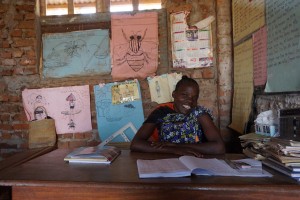 The best thing about being part of the Teacher Changemaker network is that we meet many Changemakers who give us many new skills. I have learnt the qualities of a good teacher, how to handle the classroom situation and how to make the classroom into a good learning environment.
The best thing about being part of the Teacher Changemaker network is that we meet many Changemakers who give us many new skills. I have learnt the qualities of a good teacher, how to handle the classroom situation and how to make the classroom into a good learning environment.
Being a Changemaker means being a teacher who is an all rounder, being a teacher who has a growth mind-set not a fixed mind-set and a teacher who is always ready for anything. As a Changemaker, you have to practice what you preach. You have to be innovative, influential, creative and motivate the learners.
This year I will use one micro innovation that I call ‘I do, we do, you do’. I will first do on my own as the learners watch and learn from me. Then ‘we do’ together. Then ‘you do’ – one particular learner will do as I observe and correct the work. We had some training about this. I’ve tried it before and it always works very well. Even during our teacher training, we do the exercises like this and it’s a nice technique.
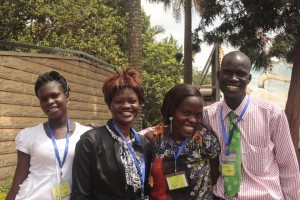 Since being involved in the Teacher Changemaker network, I have one success story about a child who didn’t enjoy learning. The child came from a long distance away, so the problem was lack of lunch, because at school we don’t provide food for the learners. I decided to talk to the parents of the child to make a plan. I started by advising them that in life there is mostly one thing: if the stomach is full, the brain will be open to learning new things, but if the stomach is complaining, the brain is focused on the stomach. The parents followed my advice and sent the child to school with packed lunch. Soon after, the learning behaviour of the child changed – they came to school early and concentrated in class. When the year ended last year, the child passed very well. After I saw the positive progress of the child, I told my fellow Changemakers in my school about the procedure I had used.
Since being involved in the Teacher Changemaker network, I have one success story about a child who didn’t enjoy learning. The child came from a long distance away, so the problem was lack of lunch, because at school we don’t provide food for the learners. I decided to talk to the parents of the child to make a plan. I started by advising them that in life there is mostly one thing: if the stomach is full, the brain will be open to learning new things, but if the stomach is complaining, the brain is focused on the stomach. The parents followed my advice and sent the child to school with packed lunch. Soon after, the learning behaviour of the child changed – they came to school early and concentrated in class. When the year ended last year, the child passed very well. After I saw the positive progress of the child, I told my fellow Changemakers in my school about the procedure I had used.
The happiest moment I have ever had is when I graduated from teaching college. I found that during my school practice I got an A! I celebrated this moment, because it’s the moment I became a qualified teacher.
I want to go to the next level of education. I want to do a degree in primary education. If I can, I’ll try East African International University in Kampala where this year’s STIR Education summit was held. I will work very hard to achieve this goal.
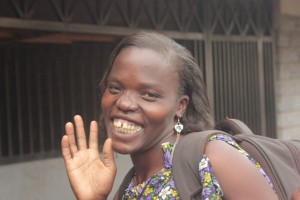 My role model is my dad because he is a teacher, so I’ve also decided to take his profession. He is a head teacher in St.Luke’s Primary School in Nwoya district. I always look at what he does and admire him because he is funny, friendly and nice.
My role model is my dad because he is a teacher, so I’ve also decided to take his profession. He is a head teacher in St.Luke’s Primary School in Nwoya district. I always look at what he does and admire him because he is funny, friendly and nice.
If I could give one piece of advice to a group of people it would be to be comfortable with change. They should not be static. If change comes, they should be open to new things. Like if a new teaching innovation is introduced we should embrace it.
Posted in News |
Tagged African Revival, Changemaker, Development, ECD, Education, Gulu, inspiration, International Development, Jumpstart!, Kampala, Nursery School, School Development, STIREducation, Teacher, Teacher training, Uganda |
Leave a comment
Posted on February 3, 2016 by Sophie Hicks
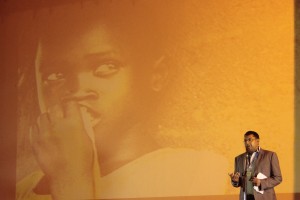 Elijah (pictured left) was the first boy in his village in rural Uganda to go to school. But seven years later, on the last day of Primary School, Elijah was unable to write a paragraph, read anything more than the simplest of sentences, or add and subtract. His father, dismayed that his son had failed so dramatically, walked to the school to visit the teacher and demand some answers. He said, “you failed me and you failed my son. I thought his life would be better than mine if he had an education”. And the teacher replied, “the son of a donkey will always be a donkey”.
Elijah (pictured left) was the first boy in his village in rural Uganda to go to school. But seven years later, on the last day of Primary School, Elijah was unable to write a paragraph, read anything more than the simplest of sentences, or add and subtract. His father, dismayed that his son had failed so dramatically, walked to the school to visit the teacher and demand some answers. He said, “you failed me and you failed my son. I thought his life would be better than mine if he had an education”. And the teacher replied, “the son of a donkey will always be a donkey”.
Such bad teachers are of course an anomaly in Uganda. But this story is a reflection of a problem facing many children across the world: lack of quality education in the classroom that leads to many pupils leaving primary school without being able to read, write or solve a simple mathematical problem. Quality education was also set as one of the new Sustainable Development Goals by the United Nations, who have identified that, although the number of children going to school has increased, levels of literacy levels in many countries have actually deteriorated.
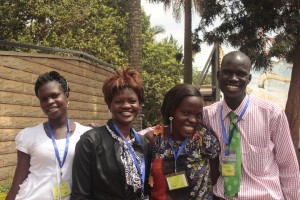 It is this problem that the Teacher Changemaker network in Uganda, led by STIR Education, aims to address. The network is designed for teachers to share ideas and innovations, as well as to provide a source of motivation for participants in what can be a difficult working environment. African Revival’s Jumpstart! team has been helping STIR to manage the network in Nwoya district, and recently accompanied 28 Teacher Changemakers to the annual STIR network summit in Kampala. Held in the ‘Wonderland’ complex in the grounds of the International University of East Africa, over 1,000 teachers attended the summit to receive certificates attesting to their hard work as Changemakers and to listen to talks by several keynote speakers, including government representatives from the Ministry of Education and Ugandan motivational speaker Fagil Musa Mandy.
It is this problem that the Teacher Changemaker network in Uganda, led by STIR Education, aims to address. The network is designed for teachers to share ideas and innovations, as well as to provide a source of motivation for participants in what can be a difficult working environment. African Revival’s Jumpstart! team has been helping STIR to manage the network in Nwoya district, and recently accompanied 28 Teacher Changemakers to the annual STIR network summit in Kampala. Held in the ‘Wonderland’ complex in the grounds of the International University of East Africa, over 1,000 teachers attended the summit to receive certificates attesting to their hard work as Changemakers and to listen to talks by several keynote speakers, including government representatives from the Ministry of Education and Ugandan motivational speaker Fagil Musa Mandy.
The speeches on the day were varied and inspiring. Many of the speakers focused on the characteristics of a Changemaker, highlighting that change first starts with the individual and that the teachers must make an effort to foster qualities such as discipline and efficiency in themselves as a prelude to change in the classroom. The Commissioner of Private Education emphasised the necessity of good habits: “If you want to be change agents, you must change yourselves first. Make it a habit that whatever God has given you to do, you do it with all your heart, all of your strength and all of your love. Learn to have good habits of time management, of working, of not missing classes.”
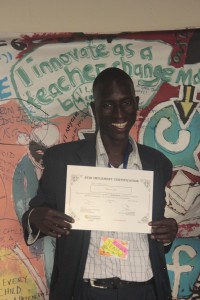
Gino (right), a nursery teacher from Purongo Hill Primary School in Nwoya district, reaffirmed this lesson after the conference: “The change begins with me the teacher. If I want to teach others, I really must have the courage to identify where my own weaknesses are, so I can begin a new journey of growth as both an individual, and an educator”
There was also an emphasis on rebranding the role of the teacher. In Uganda, the teaching profession has lost its prestige and is considered by many an undesirable role due to the meagre salary and often isolated posts in rural schools. But STIR wants to challenge the negative perceptions of educators and promote teaching as a noble, valuable profession – and teachers as powerful agents of change.
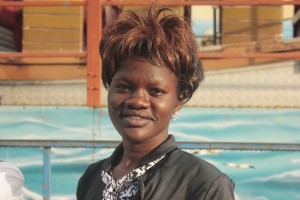 The summit was a perfect opportunity to reaffirm the values of the network and celebrate the hard work of the participating teachers to instigate change in their schools and communities. The Teacher Changemaker network encourages teachers to identify problems in their school and create ‘micro-innovations’ to address them – in collaboration with their fellow Changemakers, with whom participants can share, discuss and analyse ideas. Irene (left), a nursery teacher from Anaka Primary School explains the process: “One of us may ask, ‘what can we do to help this child’. So we sit down and share together, and discuss what we should do? Everyone contributes their opinion and then we put the ideas together and work hand in hand to reach a solution. We first discuss, then problem solve.”
The summit was a perfect opportunity to reaffirm the values of the network and celebrate the hard work of the participating teachers to instigate change in their schools and communities. The Teacher Changemaker network encourages teachers to identify problems in their school and create ‘micro-innovations’ to address them – in collaboration with their fellow Changemakers, with whom participants can share, discuss and analyse ideas. Irene (left), a nursery teacher from Anaka Primary School explains the process: “One of us may ask, ‘what can we do to help this child’. So we sit down and share together, and discuss what we should do? Everyone contributes their opinion and then we put the ideas together and work hand in hand to reach a solution. We first discuss, then problem solve.”
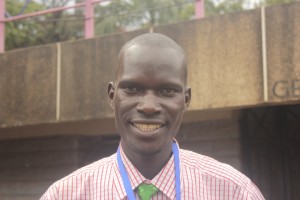 Sunday (right), a 22 year-old teacher from Lacek Primary School in Nwoya district, identified his pupils’ home environment as a major obstacle to learning. Sometimes parents show little interest in their children’s education and do not save the necessary funds to pay school fees and purchase scholastic materials. So Sunday decided to start a Village Savings and Loans Association (VSLA) for the parents: “My micro-innovation is that I am bringing parents closer to my school through a Village Savings and Loans Association. They come and save money together, and also monitor their children in class, which helps to improve educational performance.”
Sunday (right), a 22 year-old teacher from Lacek Primary School in Nwoya district, identified his pupils’ home environment as a major obstacle to learning. Sometimes parents show little interest in their children’s education and do not save the necessary funds to pay school fees and purchase scholastic materials. So Sunday decided to start a Village Savings and Loans Association (VSLA) for the parents: “My micro-innovation is that I am bringing parents closer to my school through a Village Savings and Loans Association. They come and save money together, and also monitor their children in class, which helps to improve educational performance.”
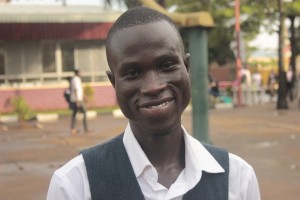 The network also encourages participation from local leaders, working across the system and targeting different layers of society to ensure that the approach is holistic, inclusive and instigates change at every level. Without ‘permission to innovate’ from parents and district officials, STIR Education CEO Sharath Jeevan acknowledged that their approach may not be effective. Stephen, a teacher from Nwoya central agreed: “Improving a child’s learning is not the responsibility of only one person. It is for all stakeholders, like the local leaders, the parents, the teachers and everybody in the community.”
The network also encourages participation from local leaders, working across the system and targeting different layers of society to ensure that the approach is holistic, inclusive and instigates change at every level. Without ‘permission to innovate’ from parents and district officials, STIR Education CEO Sharath Jeevan acknowledged that their approach may not be effective. Stephen, a teacher from Nwoya central agreed: “Improving a child’s learning is not the responsibility of only one person. It is for all stakeholders, like the local leaders, the parents, the teachers and everybody in the community.”
However the purpose of the summit in Kampala was primarily to celebrate the efforts of the teachers themselves to bring quality education to the classroom. Fagil Musa Mandy encapsulated their importance to Uganda perfectly in his powerful speech, when he said: “It is teachers who help to make the child’s dream clearer and let it grow. The only profession that opens hearts and makes them grow into flowers is the teacher”.
Posted in News |
Tagged Africa, African Revival, Changemaker, Education, Gulu, inspiration, International Development, Jumpstart!, Kampala, STIREducation, Uganda |
Leave a comment
Posted on November 18, 2015 by Sophie Hicks
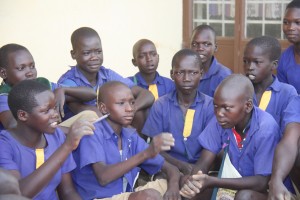 Pupils’ entrepreneurship clubs have also now been established in all 15 schools that African Revival works with through the School Demonstration Garden Project. There are 50 members with equal number of boys and girls in each school. The club members have elected their leaders and are being guided by a teacher from each school. Having selected their crops to plant, which will form their micro enterprises, members are now undergoing training on business planning and management using the School Enterprise Challenge methodology by Teach A Man to Fish. These newly acquired business skills are to be implemented within their school garden project. This practical application will serve as a unique and useful experience for these pupils, equipping them with the skills to flourish in the business of farming, leading to increased professional stability when they leave school.
Pupils’ entrepreneurship clubs have also now been established in all 15 schools that African Revival works with through the School Demonstration Garden Project. There are 50 members with equal number of boys and girls in each school. The club members have elected their leaders and are being guided by a teacher from each school. Having selected their crops to plant, which will form their micro enterprises, members are now undergoing training on business planning and management using the School Enterprise Challenge methodology by Teach A Man to Fish. These newly acquired business skills are to be implemented within their school garden project. This practical application will serve as a unique and useful experience for these pupils, equipping them with the skills to flourish in the business of farming, leading to increased professional stability when they leave school.
Otwe Pupils’ Entrepreneurship Club
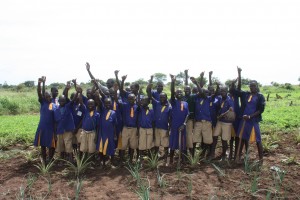
The Otwe Primary SDG Pupils’ Entrepreneurship club is in high spirits. The bean crop that they planted back in March is doing very well, despite a prolonged drought and damage from stray animals. The rain has at last come, and the pupils are seeing the bountiful effects of their hard work. Soon they hope to harvest and have already started to scout out surrounding villages and towns to assess market potential and decide which marketplace will bring them the highest profit. Head of Marketing, Boniface Rubanga, explained in more detail how the club chooses where to sell:
“Me and the marketing team go to the market and ask for the middle man, and if we think that place can fit in our needs, we can choose that middle man to take the produce.
We prefer selling our things in kilos because with these cup things they can cheat you. For Kilos, you can weigh from here and you can easily come to market and know what you are going to get.”
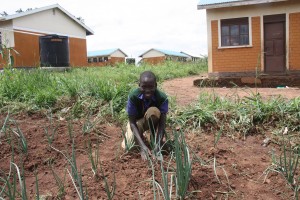 The club has recently received training in marketing skills to support them in this aspect of the project. African Revival Project Officer Babra notes that one of the principle objectives is to enable them to be self-reliant in the future:
The club has recently received training in marketing skills to support them in this aspect of the project. African Revival Project Officer Babra notes that one of the principle objectives is to enable them to be self-reliant in the future:
“We actually train them on how to produce, how to invest, how to add value to the products and how to market it […] our schools are located in the rural areas where the major activities are actually farming but the pupils have realized that the actual challenge faced is the marketing strategy.”
The skills transferred through the Pupil’s Entrepreneurship Club are helping to fill this gap in knowledge and ensure that pupils can effectively handle the post-production and financial aspect of farming.
And some of them already have interesting plans for how they will use the profits from the bean crop, a portion of which will be shared amongst group members (the rest will be added to the group account for future activities). Boniface wants to save his cut with the help of his mother, who is in the Parents’ VSLA group:
“I am in p6 and next year I am in p7. With these savings, it’s going to help me to buy some text books to help me prepare for the national examinations.”
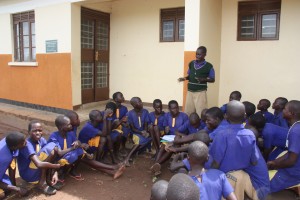 While Boniface has ambitions to become a vicar when he leaves school, he also intends to keep on farming alongside this profession in order to provide his household with a secure source of nutrition, and generate a profit through selling the surplus. As such, the business skills he is learning through the Pupils’ Entrepreneurship Club will continue to serve him well in the future.
While Boniface has ambitions to become a vicar when he leaves school, he also intends to keep on farming alongside this profession in order to provide his household with a secure source of nutrition, and generate a profit through selling the surplus. As such, the business skills he is learning through the Pupils’ Entrepreneurship Club will continue to serve him well in the future.
Posted in News |
Tagged Development, Gulu, School Development, School garden, Uganda |
Leave a comment
Posted on November 12, 2015 by Sophie Hicks
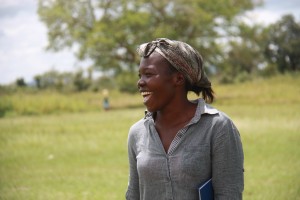 Babra Akello, aged 27, Is African Revival’s Agricultural Project Officer. Originally from Lira, she moved to Gulu together with her husband, with whom she has four year-old twins Jemimmah and Jesse. Babra completed a Certificate in General Agriculture at Busitema University in Soroti district, and is now studying part time for her degree in Agriculture at Uganda Martys University. After roles with the International Institute of Rural Reconstruction and Action Against Hunger, she joined African Revival in January 2012 as an Agricultural Extension Worker, before being promoted to Agricultural Project Officer. Here, Babra tells us more about her role with AR and her long-standing passion for farming.
Babra Akello, aged 27, Is African Revival’s Agricultural Project Officer. Originally from Lira, she moved to Gulu together with her husband, with whom she has four year-old twins Jemimmah and Jesse. Babra completed a Certificate in General Agriculture at Busitema University in Soroti district, and is now studying part time for her degree in Agriculture at Uganda Martys University. After roles with the International Institute of Rural Reconstruction and Action Against Hunger, she joined African Revival in January 2012 as an Agricultural Extension Worker, before being promoted to Agricultural Project Officer. Here, Babra tells us more about her role with AR and her long-standing passion for farming.
In my degree in agriculture I’m learning a lot. For example, the aspects of agricultural development, sustainable management of resources and different techniques of growing crops and handling animals. It’s a broad course.
My responsibilities as Agricultural Project Officer are to ensure that I directly implement African Revival’s project with the beneficiaries in the schools that we work with and to offer trainings in agricultural practices, VSLA and business skills. And also I do represent AR at a parish level, district level and country level. Now, I am implementing the school demonstration garden in 8 schools in Amuru district, so ensuring that all the good agricultural practices are taught and ensuring that what I am training the beneficiaries, they are also learning and replicating at the household level. And with the pupil’s clubs, ensuring that they are taught business models so that they can be well acquainted with the life after school, so that in case they don’t continue with their studies they can be self-reliant and not dependent on their parents.
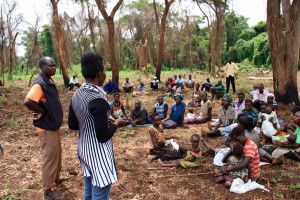 I have done many vocational trainings while working for African Revival and other organisations. I underwent defensive motorbike training. This is more of a safety thing, when you are riding, what you should observe, and actually how to overcome some of the faults or breakdowns in the motorcycle, so you can fix them without taking them to the mechanics. Just to keep you safe when you are driving.
I have done many vocational trainings while working for African Revival and other organisations. I underwent defensive motorbike training. This is more of a safety thing, when you are riding, what you should observe, and actually how to overcome some of the faults or breakdowns in the motorcycle, so you can fix them without taking them to the mechanics. Just to keep you safe when you are driving.
During my free time I like interacting with the children. With my own, but even with other children. The children like me even if I reach home you may not even understand who is my child or who is not my child because every time I am surrounded by children so I just enjoy interacting with them in my free time. The children collect their homework and I actually help them because as a parent, you should guide them. Where we live, there are many children and they are going in the same school, and they converge together and we do it together.
Being a child-centred person, I so much enjoy working with the children involved in the SDG Pupil’s Entrepreneurship Club. I just enjoy focusing on the future of the children. And the other thing I enjoy most is also working with the community that African Revival works with. It is not easy in the north to find parents in the school, but what I like most about our project is that it brings the parents closer to the school, and makes them know the benefit of education. Children can’t move forward without the support of their parents, so therefore African Revival having their projects bring parents closer to the school makes me more interested, and I enjoy it.
When I was younger, I wanted to be a veterinary doctor. In my village, we had only one veterinary doctor, and my father used to have animals, chickens, goats, cows, and each time this vet comes, he would treat the animals and he would be given a big sum of money. And I put into my mind that I must study and become a vet doctor so that I can treat these animals of ours on my own! And I wanted to actually out-compete him in the village so that I could also be the one getting such money from the communities around us. I would not say my dream changed, because I went for a certificate in general agriculture, whereby I also studied animals and crops at the same time, so I can even treat the animals.
I started farming when I was six years old. I planted maize in that first year and I got 13,000 shillings. And I remember my mother brought a chicken with that money, and the chicken multiplied so so much, and it helped me. And then when I was ten, I planted cassava, and it so happened that that year, there was too much hunger by the time my cassava was getting ready, and it helped in sustaining our family – some was sold and some was consumed.
I secured some land in Nwoya, so now I am doing my farming in Nwoya. At first I brought 6 achres, now I’ve added 4, so I own 10 acres with my husband as a family. I have a casual worker, so I am renting for the casual worker, but I plan this December to put up some small house there, so the worker can stay there. I very much want to expand, because with time I want to get back to farming. That’s the plan I have.
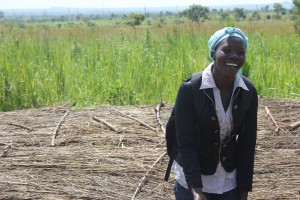 In the future, I want to farm commercially. I want to have a diversity of enterprises. Right now I have some perennials, I have some fruit trees, I have field crops, and I plan to integrate vegetables, so I want to have actually a diversity of enterprises. And soon I want to buy some animals. At the moment I am still using people’s labour in terms of hiring tractors and ox-ploughs. But already I have brought my own plough. So this December I am planning to buy the ox animals so that I do not have to continue hiring and keep more of the profits.
In the future, I want to farm commercially. I want to have a diversity of enterprises. Right now I have some perennials, I have some fruit trees, I have field crops, and I plan to integrate vegetables, so I want to have actually a diversity of enterprises. And soon I want to buy some animals. At the moment I am still using people’s labour in terms of hiring tractors and ox-ploughs. But already I have brought my own plough. So this December I am planning to buy the ox animals so that I do not have to continue hiring and keep more of the profits.
I am very much happy with the role that agriculture plays in my life. Agriculture provides a source of food for myself, my home and income generation. In Uganda, as a whole, agriculture plays a vital role and is the backbone of the country.
Posted in News |
Tagged Acholi, African Revival, Gulu, School Development, School garden, Uganda |
Leave a comment
Posted on November 11, 2015 by Sophie Hicks

Babra Akello, aged 27, is African Revival’s Agricultural Project Officer. Here, Babra gives us an insight into the progress of the School Demonstration Garden project, including the benefits and challenges of the project, and some uplifting success stories that she has witnessed while working closely with the parents and students.
Looking at the situation where our beneficiaries are, I feel the SDG has come as a solution to the problems that our rural schools face. Because looking at the rural schools, parents are so far away from the school, parents are not always willing to contribute to the development of the school, so the school management and the head teachers have to pull ropes with the parents. When it reaches the time of examinations, pupils have not paid, but the school has to buy chalks, reference books etc. But the SDG brings parents closer to the school, opening their eyes to the school and contributes towards the development of the school.
And by them coming to the school, they are not just coming to work on the project, but they are coming to check on the progress and education of their children. And this follow-up for any other parents who are not involved is hard to do. And then it is benefiting them because as they come to work, they are learning different knowledge in agricultural practices, in saving the money, in actually planning for their home, and actually finding appropriate solutions to their household problems.
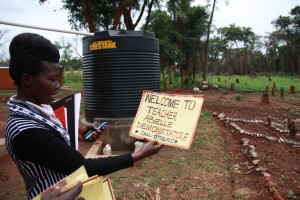 Also in a way, its even helping the communities to wipe away gender based violence. You know, most times, if all the family, the husband and wife are involved in the project, this means that they are going to listen to such messages. Because as we train them, there are crosscutting issues that I as a technical person, I do touch. On top of what the project wants from us, after training in the good agricultural practices, after doing the VSLA, there are issues of gender based violence, of HIV prevalence that we always touch upon. So in a way, the parents are all benefitting, and when they get home, they can’t now fight in their house, they can now sit together and plan for their home, plan for their education of their children.
Also in a way, its even helping the communities to wipe away gender based violence. You know, most times, if all the family, the husband and wife are involved in the project, this means that they are going to listen to such messages. Because as we train them, there are crosscutting issues that I as a technical person, I do touch. On top of what the project wants from us, after training in the good agricultural practices, after doing the VSLA, there are issues of gender based violence, of HIV prevalence that we always touch upon. So in a way, the parents are all benefitting, and when they get home, they can’t now fight in their house, they can now sit together and plan for their home, plan for their education of their children.
The agricultural practices that they learn, when they replicate at their household level, they are going to increase on their production. This means they are going to have surplus food at a household level, where they can have enough to eat, where they can have enough to keep, where they can have enough to sell and cater for other basic needs. They will be in the position to pay school fees, buy scholastic materials.
So far I would say that the project is progressing fast looking at the level we have reached. We have sensitized, we have formed the groups, we have initiated the SDGs, we have already got some harvest from the garden. And also the most interesting thing, you know the people we train, there are people who are fast learners, people who are medium, people who takes time to understand. And the most interesting part is that the fast learners have already even got to the level of replicating what they have learned form the SDG at home. So to me, that is already progress in the project.
As a good trainer, much as there are fast learners, you concentrate most on the medium and slow learners, so they can catch up with the fast learners. So like with the parents group, we cannot now say we are going to push them push them – what you do, each and every time you give assignments, today we’ve learned this, and next week people should begin replicating, and when you are looking out for who has replicated, you start out with the slow learners, asking ‘have you done this’ in a good way because you don’t have also to make them know that they are slow in learning. You just use your facilitating talents to make them also understand and slowly slowly, they will also come to understand.
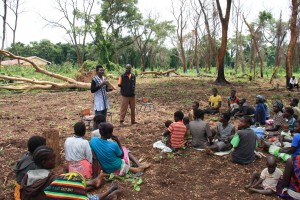 One of the challenges of the SDG is the issue of land dispute. You know, land issues in the Acholi region are not something easy, especially in Langera. During the project launch in the district, one of the committee members of the school just stood up boldly and said ‘I don’t think this project is going to work because in Langera we don’t have so much land’. And that school was already assigned to me, so I felt like ‘how am I going to overcome this?’. But something came into my mind that ‘no you go on, and do what you’re supposed to do, and maybe it can turn out to be a success story’. And when I went for the mobilisation, I found the head teacher who told me, ‘you know what, you don’t have to fear, you just come, the school is there, we are going to work together, and overcome these land issues, and what we are going to do, we are going to sit with these management committees, and make sure we apportion the SDG site to be on the other side where they are wrangling over”. So the parents came, and I used my tricks with the parents to ensure that we succeeded. And the parents were on my side, everything went well, and right now Langera stands to be a success story because there are no more land wrangles, and when the bestseller donor came, the chairperson of the SMC even highlighted that as a success – that the SDG has enabled us to solve the land issues that were in the school. So that wasn’t easy to reach the level we have now.
One of the challenges of the SDG is the issue of land dispute. You know, land issues in the Acholi region are not something easy, especially in Langera. During the project launch in the district, one of the committee members of the school just stood up boldly and said ‘I don’t think this project is going to work because in Langera we don’t have so much land’. And that school was already assigned to me, so I felt like ‘how am I going to overcome this?’. But something came into my mind that ‘no you go on, and do what you’re supposed to do, and maybe it can turn out to be a success story’. And when I went for the mobilisation, I found the head teacher who told me, ‘you know what, you don’t have to fear, you just come, the school is there, we are going to work together, and overcome these land issues, and what we are going to do, we are going to sit with these management committees, and make sure we apportion the SDG site to be on the other side where they are wrangling over”. So the parents came, and I used my tricks with the parents to ensure that we succeeded. And the parents were on my side, everything went well, and right now Langera stands to be a success story because there are no more land wrangles, and when the bestseller donor came, the chairperson of the SMC even highlighted that as a success – that the SDG has enabled us to solve the land issues that were in the school. So that wasn’t easy to reach the level we have now.
Schools are experiencing land disputes, because initially in the rural communities, somebody will just come willingly and give out land for the school. And at times they go into signing maybe an agreement that I am giving this portion of land. But eventually the person dies and either the children or the grandchildren now begin disturbing the school, and also most of the schools do not possess a land title, so such issues makes conflicts to always arise.
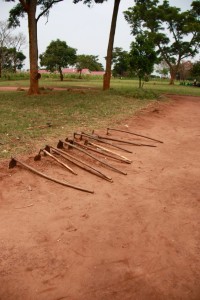 One of my favourite moments of the project was in Layima Primary School. Layima has been a school where the parents are so so much interested in the project; their numbers have been overwhelming. When you take a project in the community, the expectations are always so high, but we have a budget line that we are supposed to operate within, and it can look quite challenging. At Layima, especially the tools for the beneficiaries – at first this looked like it was a challenge because the numbers were up to 80 members, but there were only 47 hoes. My favourite moment came when we had to sit down with the parents and make them understand that this other support, the tools are just brought to ensure that work starts, but they themselves have to own the project, and if they are willing they can even contribute towards the project by coming with their hoes. And it was an amazing moment when the members agreed that ‘lets first put these hoes intact and use our own hoes’. Even up to now, we’ve not distributed the hoes, and the parents are thinking of giving them to the school, so that the entrepreneurship club can be using it. That was my favourite moment because it felt challenging but a solution was derived.
One of my favourite moments of the project was in Layima Primary School. Layima has been a school where the parents are so so much interested in the project; their numbers have been overwhelming. When you take a project in the community, the expectations are always so high, but we have a budget line that we are supposed to operate within, and it can look quite challenging. At Layima, especially the tools for the beneficiaries – at first this looked like it was a challenge because the numbers were up to 80 members, but there were only 47 hoes. My favourite moment came when we had to sit down with the parents and make them understand that this other support, the tools are just brought to ensure that work starts, but they themselves have to own the project, and if they are willing they can even contribute towards the project by coming with their hoes. And it was an amazing moment when the members agreed that ‘lets first put these hoes intact and use our own hoes’. Even up to now, we’ve not distributed the hoes, and the parents are thinking of giving them to the school, so that the entrepreneurship club can be using it. That was my favourite moment because it felt challenging but a solution was derived.
Another amazing moment was in Abera p/s. During the formation, this group had the highest expectations, more than any other group. With the trainings and mentorship, they turned out to be the best group via production and they are a group of 55 members only, but they are quite hardworking. And as I talk now, they are still leading in the production record. For the first season, they have actually got 1.7 million out of their production, and we are expecting more for the second season. So that actually amazed me, because looking at that, it makes me feel like the effort, my travel there, my trainings, has yielded fruits. So it gives me happiness.
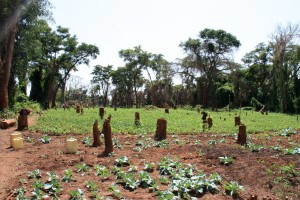 I hope that the project will achieve all its objectives. Looking at the objectives of bringing the parents closer, increasing the retention rates of the pupils in school, ensuring the school feeding program, increasing productivity – with the speed we are going, I hope we will achieve all the objectives.
I hope that the project will achieve all its objectives. Looking at the objectives of bringing the parents closer, increasing the retention rates of the pupils in school, ensuring the school feeding program, increasing productivity – with the speed we are going, I hope we will achieve all the objectives.
Posted in News |
Tagged African Revival, Uganda |
Leave a comment








































